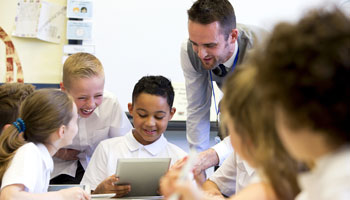As schools and communities navigate the unprecedented circumstances presented by the pandemic, they continue to encounter unique challenges requiring them to identify and adopt new ways of supporting their learners.
The factors and their impacts on the future needs of educators remains the focus of ongoing work by The Evidence Institute. Earlier this year the Institute conducted the AISNSW Remote Learning Survey to surface the opinions and experiences of educators about remote teaching during the initial stages of the pandemic. With almost 1,000 responses, data provided considerable insights into areas such as preparedness, practice change, areas of support, and the use of platforms and technologies.

Enhancing student agency and balancing technology and non-technology reliant remote learning is a pedagogical focus for teachers moving forward.
Initial survey findings have been visualised in an infographic displaying insights, challenges, and opportunities that educators identified as they focused on maintaining and enhancing student learning. A summary of findings is unpacked in Part 1 of this article series. Part 2 focuses on what aspects of learning design educators plan to adapt, and what needs to be created in order to further enhance student learning.
Key Insights
This final part of the series highlights key insights arising from the research. These are clustered into two key areas that emphasise the need for a renewed and ongoing focus on the design of learning to:
- enhance student agency and personalise learning
- balance technology-enhanced and non-technology reliant remote learning.
Enhance student agency and personalise learning
Evidence gathered through the Remote Learning Survey indicated a need to:
- Focus on the role of self-paced or independent learning for students of different ages, abilities and contexts.
- Explore specific pedagogical approaches.
- Consider the impact of school and classroom structures and timetables.
- Develop systems for ensuring a 'one size fits all approach' is not adopted.
- Select and enhance the use of appropriate platforms or programs to facilitate learning and connection.
- Explore implications for gathering evidence of learning and providing feedback.
Balance technologically enhanced and non-technology reliant remote learning
Respondents to the Remote Learning Survey recognised a need to:
- Enhance targeted resource development - online and non-technology reliant.
- Explore the impact of technological access and skill level challenges (students and educators).
- Develop blended learning approaches - balancing synchronous and asynchronous tasks with and without technology.
- Consider implications for practical activities/subjects and managing curriculum specific needs.
- Ensure adequate peer to peer collaboration opportunities.
- Develop a process for supporting students across multiple learning locations.

Post remote learning, teachers are placing a great focus on the implementation of digital pedagogies.
Where to from here
The impact of the pandemic on independent schools has resulted in an acceleration of the changing learning landscape as schools have systematically targeted practices that are fit for the future. Research and reality have intersected. Schools continue to increase their focus on student learning at the point of need, self-regulation of learning, agency, personalised learning, technology-enabled learning, and staff and student wellbeing. At the heart of much of this work is the expansion of educator understanding and implementation of digital pedagogies.
Independent schools continue to lead the way with innovative practices. To highlight some of the approaches the sector has adopted during this time, five case studies will be undertaken in a partnership between The Evidence Institute and the University of Technology Sydney. These case studies will capture the experiences of educators and students in metropolitan and regional NSW, and focus on the use of digital pedagogies to improve learning and wellbeing for all students. The range of schools involved in the case studies reflects the diversity of the independent sector. These schools represent various socio-economic, religious and philosophical perspectives within the sector and range across metropolitan and regional primary and K-12 schools.
The Remote Learning Survey Case Studies will begin to be published in early 2021.
Additional outputs from this research can be accessed via the Opportunities out of Remote Learning webpage. These include the Remote Learning: Rapid Literature Review developed in partnership with ACER, and the recently hosted AISNSW Virtual Masterclass Series: Learning our way into the future.
New to AISNSW and want to receive AISNSW Education News updates? Click here to register, and select ‘AISNSW Education News’ on the Areas of Interest/Subscriptions page.